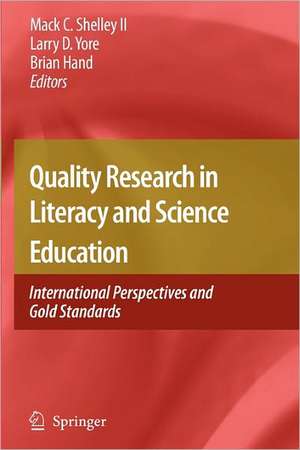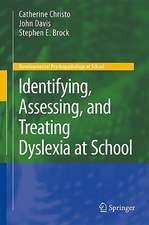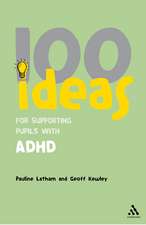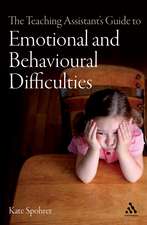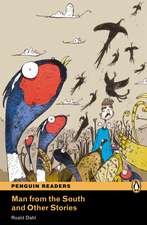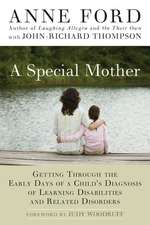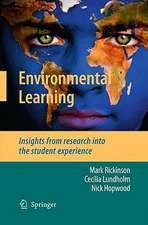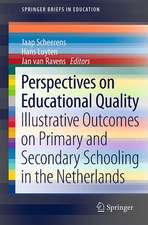Quality Research in Literacy and Science Education: International Perspectives and Gold Standards
Editat de Mack C. Shelley, Larry D. Yore, Brian B. Handen Limba Engleză Paperback – 19 oct 2010
| Toate formatele și edițiile | Preț | Express |
|---|---|---|
| Paperback (1) | 947.22 lei 6-8 săpt. | |
| SPRINGER NETHERLANDS – 19 oct 2010 | 947.22 lei 6-8 săpt. | |
| Hardback (1) | 953.57 lei 6-8 săpt. | |
| SPRINGER NETHERLANDS – 15 ian 2009 | 953.57 lei 6-8 săpt. |
Preț: 947.22 lei
Preț vechi: 1155.14 lei
-18% Nou
Puncte Express: 1421
Preț estimativ în valută:
181.36€ • 188.85$ • 150.48£
181.36€ • 188.85$ • 150.48£
Carte tipărită la comandă
Livrare economică 14-28 februarie
Preluare comenzi: 021 569.72.76
Specificații
ISBN-13: 9789048178773
ISBN-10: 9048178770
Pagini: 696
Ilustrații: XXIX, 666 p.
Dimensiuni: 155 x 235 x 37 mm
Greutate: 0.96 kg
Ediția:Softcover reprint of hardcover 1st ed. 2009
Editura: SPRINGER NETHERLANDS
Colecția Springer
Locul publicării:Dordrecht, Netherlands
ISBN-10: 9048178770
Pagini: 696
Ilustrații: XXIX, 666 p.
Dimensiuni: 155 x 235 x 37 mm
Greutate: 0.96 kg
Ediția:Softcover reprint of hardcover 1st ed. 2009
Editura: SPRINGER NETHERLANDS
Colecția Springer
Locul publicării:Dordrecht, Netherlands
Public țintă
ResearchCuprins
General Introduction.- Education Research Meets the “Gold Standard”: Evaluation, Research Methods, and Statistics after No Child Left Behind.- Setting the Agenda: Science Education and Science-based Research.- Why “Gold Standard” Needs Another “s”: Results from the Gold Standard(s) in Science and Literacy Education Research Conference.- Research and Practice: A Complex Relationship?.- Moving Beyond the Gold Standard: Epistemological and Ontological Considerations of Research in Science Literacy.- Longitudinal Studies into Science Learning: Methodological Issues.- An International Perspective of Monitoring Educational Research Quality: Commonalities and Differences.- Considering Research Quality and Applicability Through the Eyes of Stakeholders.- Curriculum and Pedagogy.- Researching Effective Pedagogies for Developing the Literacies of Science: Some Theoretical and Practical Considerations.- Pedagogy, Implementation, and Professional Development for Teaching Science Literacy: How Students and Teachers Know and Learn.- Approaching Classroom Realities: The Use of Mixed Methods and Structural Equation Modeling in Science Education Research.- Mixed-methodology Research in Science Education: Opportunities and Challenges in Exploring and Enhancing Thinking Dispositions.- New Directions in Science Literacy Education.- Statistics, Research Methods, and Science Literacy.- Multilevel Modeling with HLM: Taking a Second Look at PISA.- Methods from Item Response Theory: Going Beyond Traditional Validity and Reliability in Standardizing Assessments.- Confounding in Observational Studies using Standardized Test Data: Careful Disentanglement of Statistical Interpretations and Explanations.- Predicting Group Membership using National Assessment of Educational Progress(NAEP) Mathematics Data.- Incorporating Exploratory Methods using Dynamic Graphics into Multivariate Statistics Classes: Curriculum Development.- Approaches to Broadening the Statistics Curricula.- Dr. Fox Rocks: Using Data-mining Techniques to Examine Student Ratings of Instruction.- Process Execution of Writing and Reading: Considering Text Quality, Learner and Task Characteristics.- Can We Make a Silk Purse from a Sow's Ear?.- Public Policy and “Gold Standard(s)” Research.- Speaking Truth to Power with Powerful Results: Impacting Public Awareness and Public Policy.- Funding Patterns and Priorities: An International Perspective.- Research Ethics Boards and the Gold Standard(s) in Literacy and Science Education Research.- Data Sharing: Disclosure, Confidentiality, and Security.- Stitching the Pieces Together to Reveal the Generalized Patterns: Systematic Research Reviews, Secondary Reanalyses, Case-to-case Comparisons, and Metasyntheses of Qualitative Research Studies.- The Gold Standard and Knowing What to Do.- Epilogue: New Standards, New Directions, and New Realities.- Reflections on Beyond the Gold Standards Era and Ways of Promoting Compelling Arguments about Science Literacy for All.
Recenzii
The strength of this book, its inclusion of many perspectives that include political and policy pressures, budget priorities, task force reports, research complexities, curriculum complexities, and teaching-learning complexities, will be appreciated by many who see "No Childe Left Behing" and "high-stakes testing" as overly simplistic and potentially harmfull to education. It contains important information and valuable insight into the complexities of conducting quality sience literacy research in particular and education research in general. Also, the emphasis on producing research that can be understood and used properly by policy makers at local, state, and national levels is a strength of the book. I have been in the science education research field for over 40 years, including a stint as editor of the Journal of Research in Science Teaching, and I can say that I profited from reading this book.
Ron Good, Professor Emeritus, Louisiana State University and Florida State University, USA
Ron Good, Professor Emeritus, Louisiana State University and Florida State University, USA
Textul de pe ultima copertă
This book addresses implications for "Gold Standards" of education research—especially in science education and literacy. These standards are meant to provide evidence-based educational outcomes found effective in randomized controlled trials, following patterns of evidence used in medical research. Similar expectations have emerged in other countries—from education ministries, for researchers working with U.S. colleagues, and for researchers with multinational and non-profit support.
The current "Gold Standard" policy, developed in the United States through the 2001 "No Child Left Behind" [NCLB] Act and the 2002 Education Sciences Reform Act, attempts to improve the effects of schooling and enhance educational research. The contributions to this book explore perspectives on how best to implement multiple standards of education research.
The current "Gold Standard" policy, developed in the United States through the 2001 "No Child Left Behind" [NCLB] Act and the 2002 Education Sciences Reform Act, attempts to improve the effects of schooling and enhance educational research. The contributions to this book explore perspectives on how best to implement multiple standards of education research.
Caracteristici
Provides uniquely international perspectives on modern applications of research methods in education Demonstrates how researchers and educators in science education and literacy can strengthen their findings and have more impact on teachers’ classroom practice and students’ learning Shows how those who make education policy can be informed and their decisions affected by researchers Deepens and broadens communications among the fields of education, statistics, political science, and public policy Attempts to bring unity to the quantitative and qualitative research traditions
